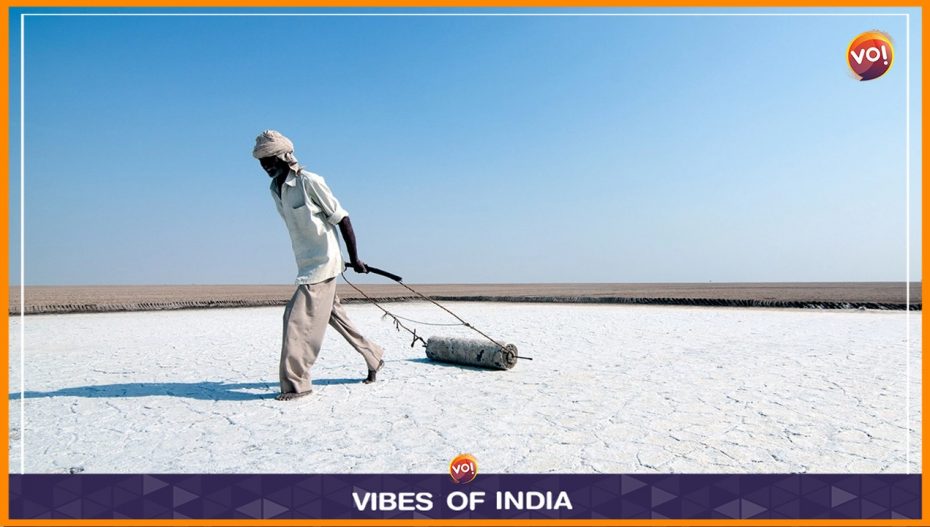Salt pan workers have become a talking point and a part of political parties’ post-election assurances to uplift their miserable lives. They work in unbearable surroundings and making wages for their survival. The Congress party has assured them a better destiny if they make it to the power.
Salt pan workers, in the vicinity, known as Agariyas. They strive to remote salt pans in adverse weather conditions of the Little Rann of Kutch (LRK), situated in the north of Gujarat. They work for eights months a year by staying in substitute huts to harvest salt. In the course of this period, they are disconnected from the human habitats as they reside 40 to 50 kms away.
Throughout the past few years, the state government announced numerous schemes for the betterment of the salt pan workers. However, representatives and activists feel that these schemes have not fulfilled the demands and the basic necessities of agariyas. The picture is unchanged and they still have to raise voices for their basic issues such as healthcare and education.
They expect that whichever party comes to the power, steps would be taken to better the living standards. Opposition party, Congress, has eminently mentioned agariyas in the election manifesto, whilst Bharatiya Janta Party (BJP) has promised to raise a huge amount of funds for the betterment of the community.
Gujarat is a substantial salt producer state of India, constitutes for more than 75 percent of the requirement of essential kitchen ingredient. Previous year, nearly 41 lakh metric tonnes of salt was produced in the LRK, a desert spread across 5,000 sq km and major part of it lands in Surendranagar district. The LRK was official declared as a Wild Life Sanctuary about 50 years ago, which added to the misery of agariyas as they became more vulnerable in the absence of land deeds.
Back in 2014 general elections, Rahul Gandhi had interacted with the salt pan workers to understand the problems they are witnessing. After that, including 80 per cent subsidy on purchasing solar-powered pumps and permanent deployment of modified buses, which were disposed by the state transport department, to be utilised as classrooms in the desert region.
“In 2017, the Gujarat government came up with a scheme wherein solar-powered pumps were given at 80 per cent subsidised rate. On an average, one horsepower pump of Rs 1 lakh would cost agariyas Rs 20,000. This scheme brought many agariyas out of debt and extreme poverty as they saved fuel cost, which was nearly 70 per cent of the total production cost,” Activist Harinesh Pandya, President of NGO ‘Agariya Hit Rakshak Manch’, said.
To fulfill the basic necessities, water tankers are being sent in the desert and medical van, along with a doctor and a nurse to the appointed spots. “Old and discarded buses were modified into smart classrooms and deployed permanently inside the desert at 43 locations to provide education to children from the community studying in Class 1 to 8. Government teachers are sent daily from the villages to take classes and even exams for eight months,” said Pandya.
In the four months of monsoon season, agariyas reside in their villages located on the sidelines of the desert. Eighty per cent of the salt pan workers pertain to the ‘Chuvaliya Koli’ community, a de-notified tribe (DNT). Pandya claims that around 10,000 agariya families, totaling close to 40,000 individuals, are engaged in salt harvesting in the LRK. The majority of these households are located in the Surendranagar district’s Patdi and Dhrangadhra talukas, while some are located in the Banaskantha, Patan, Morbi, and Kutch districts. However, community leaders believe that little progress has been made in the conditions of salt pan workers despite the adoption of numerous programmes over the years.
“Health van service is not at all regular and does not cover each spot. We still face acute shortage of water because government-hired tankers fail to cover all the families in time. Even the buses being used as classrooms are just for show because one teacher can’t teach all the students of Class 1 to 8 at once,” said Chakuji Thakor, an agariya leader. “Since LRK is a sanctuary and the government has stopped giving us the land on lease long back, banks do not give us loans because we don’t have the leased land to show.”
The promises include providing salt pan workers in the desert with RO water kiosks, Rs. 5 lakh in accident insurance, and free care up to Rs. 10 lakh at any government hospital. “We have promised that we will make it easier for agariyas to get permission for creating salt pans in the protected areas of the Wild Ass Sanctuary. Congress will also build houses and schools for salt pan workers. For better connectivity, we will also install mobile towers,” said Gujarat Congress spokesperson Manish Doshi.
On the other hand. BJP’s candidate for Dharangadhra seat, Prakash Varmora, assured that he will work hard to maximize the funds from different sources for overall betterment of agariyas. “The BJP government has already made a separate board for DNTs. I will try to make sure that the grant is used for salt pan workers too. I will also try to channelise the funds of major voluntary organisations for their development,” he said.
Also Read: Gujarat Poll Result Will Pave Way For Modi As PM In 2024, Says Assam CM











